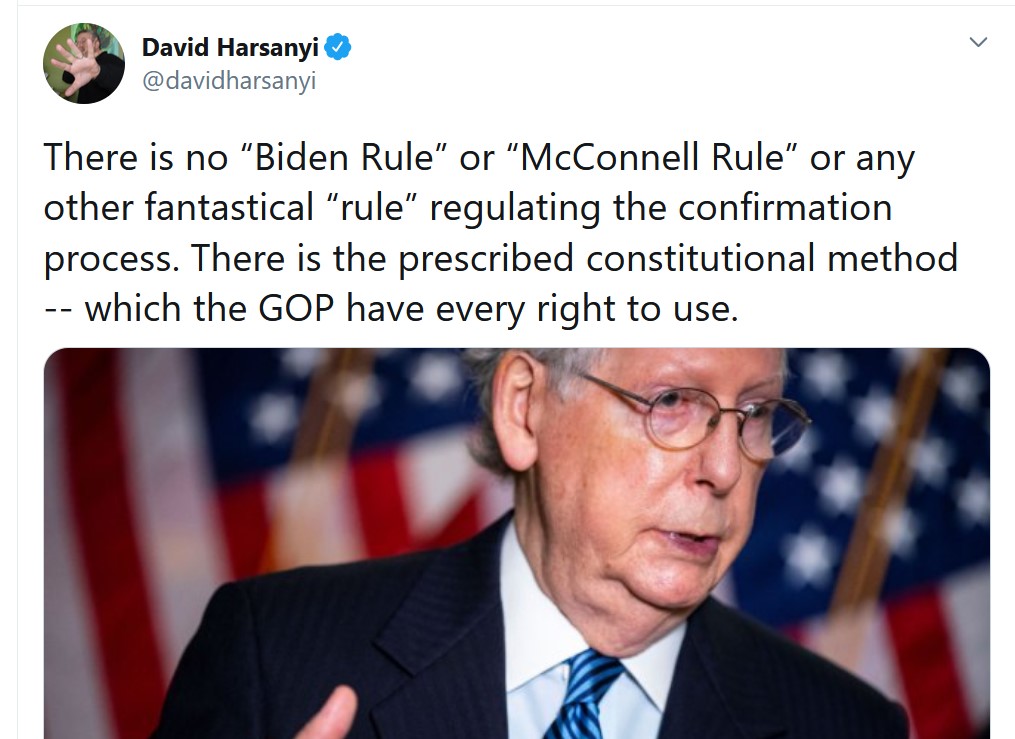Norms for thee, not for me

Reactionaries who have actually convinced themselves that Republican judicial appointees are “constitutionalists” have what they believe to be a dispositive defense of jamming a midnight appointment to the Supreme Court through:

Well, OK, let’s run with that. As I observe for the Peacock, there is no “rule” concerning the number of Supreme Court seats or the exceptions or regulations made to the Court’s jurisdiction, just the Article III powers Dems have every right to use:
The philosophical case for reforming the Supreme Court — should Democrats take over the Senate and White House in 2021 — is straightforward. While it’s possible that Trump could win re-election, virtually nobody, including Trump’s most fervent supporters, believes that Trump will win the popular vote over Joe Biden; he didn’t over Hillary Clinton in 2016. Assuming that’s correct, it would mean Democrats will have won the popular vote in seven out of the last eight presidential elections. Yet, if a Trump replacement for Ginsburg is confirmed, Republicans’ would have nominated a 6-3 majority on the Supreme Court, a split that would be essentially impossible for Democrats to displace through ordinary means, irrespective of the results of future elections.
That’s not how the system of checks and balances is supposed to work. American political elites have generally supported the strong form of judicial review that emerged in the late 19th century because the Supreme Court generally tracked with the constitutional views of the dominant political coalition. A Supreme Court representing an entrenched, unpopular minority faction that refuses to allow the popular majorities from the other party to effectively govern would be neither democratically legitimate nor politically stable.
Indeed, the previous periods in history in which the Supreme Court was controlled by an opposition faction — the early Jefferson administration, the Civil War and first years of the New Deal — all led to constitutional crises that ended only when the court itself backed down. The closest parallel to Trump getting a nominee confirmed — whether just before or after the election in a lame-duck session — would be the lame-duck court-packing of John Adams’ administration, which led to a fierce legislative backlash from Thomas Jefferson’s administration and its congressional supporters.
A Biden administration with a Democratic Congress in 2021 would be no less justified than the Jefferson administration in acting to reform the Supreme Court.
The Republican argument for confirming a last-minute Trump nominee ultimately boils down to a question of power and the letter of the law: The president and Senate control the nomination process, and nothing in the U.S. Constitution prevents them from filling a vacancy, no matter when it occurs. They can, and seemingly will, ignore the dying wishes of Ginsburg, the norms they themselves established and any remaining idea of interparty comity and fill it.
The problem Republicans will face after they do so is that expanding the size of the Supreme Court is exactly as legal as a last minute or lame-duck Supreme Court confirmation — and it’s hardly an unprecedented action. Plus, the same can be said for other measures within the power of the next, possibly Democratic Congress to restore the balance of American democracy, including eliminating the legislative filibuster to stop Republican obstructionism or granting statehood to Washington, D.C., and Puerto Rico. (In sharp contrast to McConnell’s norm-breaking, these measures would additionally make American government more democratic and representative of its people, rather than less.)
Norms once broken cannot be unilaterally restored. So if Republicans firmly establish “anything that is not strictly forbidden by the Constitution is permitted” as the de facto norm of governance, Democrats should act in kind should they win in November. This will not be an easy path for the clearly norm-loving Democratic establishment to follow, but constitutional hardball is a much better alternative for the people they represent than the Supreme Court being under the decades-long control of a political faction that has given up even trying to appeal to the majority of the American people.
Since Harsanyi has no ideological views about the Supreme Court and is motivated solely by a commitment to neutral legal principles, I’m sure he’ll agree!


